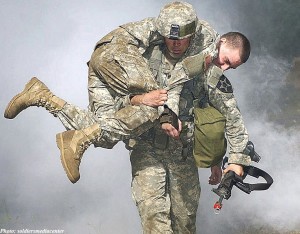 Tennessee earned the nickname the “Volunteer State” during the War of 1812 because of the prominent role played by her sons, especially during the Battle of New Orleans. When Andrew Jackson asked the state for 2,000 troops, they sent 30,000. It was therefore with good reason that the Congressional Medal of Honor Society chose Knoxville as the site for their 2014 Convention honoring a collection of forty-eight heroes who earned our nation’s highest award for heroism, the Medal of Honor.
Tennessee earned the nickname the “Volunteer State” during the War of 1812 because of the prominent role played by her sons, especially during the Battle of New Orleans. When Andrew Jackson asked the state for 2,000 troops, they sent 30,000. It was therefore with good reason that the Congressional Medal of Honor Society chose Knoxville as the site for their 2014 Convention honoring a collection of forty-eight heroes who earned our nation’s highest award for heroism, the Medal of Honor.
Sadly, not everyone in town knew about this unique event. Such was the case with a local barber who cut my hair. His father was a World War II veteran, however, who often reminded his son of the slogan drilled into his head. “You will do the difficult immediately,” the young recruits of World War II were told, “the impossible will take a little longer.”
Is Technology Ruining Your Life? Take A Quick Quiz To Find Out By Clicking Here.
As my barber plied his trade, I shared the stories from a marvelous town hall forum I had just attended with Medal of Honor recipients Hershel “Woody” Williams, Ron Rosser and Col. Wesley Fox.
[like url=https://www.facebook.com/ReturnToOrder.org]
“I Will Fight Anyone Who Dares to Take Our Freedom Away!”
CWO Hershel “Woody” Williams, at 91 years of age, is one of the oldest living recipients.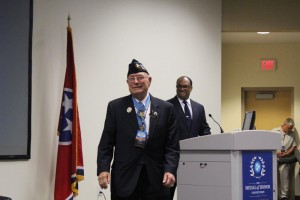 The audience chuckled when he chided organizers for giving him such a comfortable chair. “At my age,” he said, “I might fall asleep.” Nevertheless, when it came his turn to speak, he sat on the edge of his chair with the determination of one ready for more combat.
The audience chuckled when he chided organizers for giving him such a comfortable chair. “At my age,” he said, “I might fall asleep.” Nevertheless, when it came his turn to speak, he sat on the edge of his chair with the determination of one ready for more combat.
He was initially inspired to serve by the thought that our nation was in danger and our very freedom threatened. “I will join the Marines,” he recalled thinking, “and fight anyone who dares to take our freedom away.” In his mind this would entail staying on American soil. CWO Williams was shocked, after joining the Marine Corps, to find out that he, a boy from Fairmont, West Virginia, was heading to a place he had never heard of: the South Pacific.
He would ultimately earn our nation’s highest award during the battle for Iwo Jima at the very same battle that inspired the iconic flag-raising that has come to symbolize American valor. He was part of what was initially a six-man group of flamethrowers, a weapon that was widely used during the conflict. The life expectancy of such men in battle, he explained to an awestruck audience, was five minutes. All his men were quickly killed leaving him with the unenviable task of wiping out a network of six reinforced concrete pillboxes used by the Japanese to rain down death upon his fellow Americans.
The audience sat on their edge of their seats as he described advancing with his seventy-pound flamethrower in the face of withering small arms fire. He made frequent trips back to his own lines to obtain serviced flamethrowers in a battle that lasted four hours. He was ultimately successful and not only survived, but miraculously came through the ordeal without a single scratch.
One Man Assault
Sgt. Ron Rosser told of an equally gripping battle he fought during the Korean War when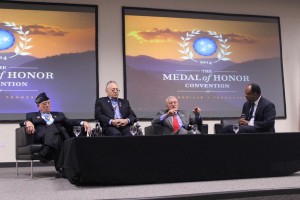 his actions earned him the Medal of Honor. He was a forward observer for Company L, 38th Infantry on a bitterly cold January day in 1952, where temperatures dipped to twenty-five degrees below zero. They numbered 173 and were charged with an impossible task of taking a hill that was fortified with 1,500 enemy combatants. Their initial attempt was repelled by fierce automatic weapons, small arms, artillery and mortar fire. With numerous casualties and a commanding officer who was incapacitated, Sgt. Rosser volunteered to lead the surviving members up the hill.
his actions earned him the Medal of Honor. He was a forward observer for Company L, 38th Infantry on a bitterly cold January day in 1952, where temperatures dipped to twenty-five degrees below zero. They numbered 173 and were charged with an impossible task of taking a hill that was fortified with 1,500 enemy combatants. Their initial attempt was repelled by fierce automatic weapons, small arms, artillery and mortar fire. With numerous casualties and a commanding officer who was incapacitated, Sgt. Rosser volunteered to lead the surviving members up the hill.
He courageously led his men back into the fight. Upon reaching the top of the hill, however, he looked around and found he was all alone. The rest had either been killed or taken cover to avoid what seemed certain death. Sgt. Rosser engaged in hand-to-hand combat and a point-blank fire fight. After exhausting his ammunition, he went back down the hill gathering wounded along the way. On two more occasions he would return to the top of the hill and engage an enemy that seemed shocked at their inability to kill one determined American soldier. During his action Sgt. Rosser single handedly killed thirteen of the enemy.
When the battle was over he accompanied the withdrawing company and, in spite of his own injuries, made several trips across open terrain under enemy fire to gather those more wounded than himself.
True Humility
Col. Wesley Fox served as a Marine for forty-three years and is also a two-war veteran. After earning a Purple Heart in the Korean War, he went on to serve in Vietnam for thirteen months as an adviser. In February of 1969, he was the commanding officer of Company A and was wounded by a fierce attack from a well concealed enemy force. Col. (then Capt.) Fox maneuvered himself into a position in which he could assess the situation. As his men began to implement the plan he had devised, the enemy attacked and Capt. Fox was wounded once again. He nevertheless kept his calm, advanced through enemy fire, neutralized the enemy position, then ordered an assault on the hostile emplacement.
The battle continued to rage, and after his executive officer was killed, Capt. Fox 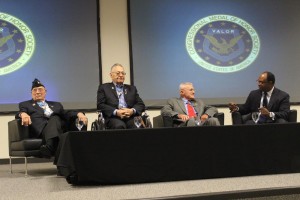 reorganized the company and directed the fire of his men as they hurled grenades and forced the enemy to retreat. During this final assault, Col. Fox was wounded a third time. He refused medical assistance, however, so that he could establish a defensive position and help organize evacuation of the wounded. He explained the concern he had that all his men were accounted for and that they all got out of the battle zone.
reorganized the company and directed the fire of his men as they hurled grenades and forced the enemy to retreat. During this final assault, Col. Fox was wounded a third time. He refused medical assistance, however, so that he could establish a defensive position and help organize evacuation of the wounded. He explained the concern he had that all his men were accounted for and that they all got out of the battle zone.
A key point in this particular battle was when the clouds parted and allowed the sun to brilliantly shine through. Col. Fox attributed such a turn of events to Divine Intervention because it allowed him to call in the much needed air strikes to eliminate machine gun nests which had caused so much devastation to his men.
This is a very brief narration of an intense battle where one man showed unbelievable courage and leadership. Hearing Col. Fox’s third-person narrative of the action would lead one to think he was not even there when it happened. It was a refreshing example of humility in a man who does the impossible yet is hesitant to draw the spotlight upon himself.
Conversation with a Flamethrower
The rest of the convention events included numerous school visits, the closing Gala that drew 1,700 participants, and the autograph session. During the town hall forum event, a Vietnam veteran sitting next to me said he planned on going.
“I have never asked anyone for an autograph,” he quickly added, “but these men’s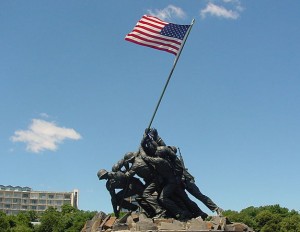 signatures mean something.” We both agreed they were of more value than the utterly meaningless, yet so coveted, signatures of athletes, musicians and movie stars.
signatures mean something.” We both agreed they were of more value than the utterly meaningless, yet so coveted, signatures of athletes, musicians and movie stars.
This same appreciation could be seen in all those who came out to see the recipients. A touching scene was that of a mother with her young son going through the hotel lobby. One by one, she introduced the wide-eyed boy to the men with the blue ribbons and attached medals hanging around their necks. The look of admiration in the boy’s eyes was a common sight with old and young during the memorable days in Knoxville.
Before the event was over, I had an unforgettable and candid conversation with CWO Williams. He is remarkably strong, both physically and mentally, for someone who fought at Iwo Jima. “What is the secret of your longevity?” I asked.
“The secret,” he said, “is to always keep a positive attitude.” Then as his eyes welled up with tears he added, “I have been given so much from my country, I am just happy that I can give something back.” I then thanked him for being such a positive role model for others, and for his heroism in World War II. After all, he volunteered to serve his country because America’s freedom was at stake. He willingly put his life on the line, did many difficult things… but on a given day, at a crucial moment, in one of our nation’s most historic battles, he did what others would have deemed the impossible.
with tears he added, “I have been given so much from my country, I am just happy that I can give something back.” I then thanked him for being such a positive role model for others, and for his heroism in World War II. After all, he volunteered to serve his country because America’s freedom was at stake. He willingly put his life on the line, did many difficult things… but on a given day, at a crucial moment, in one of our nation’s most historic battles, he did what others would have deemed the impossible.


